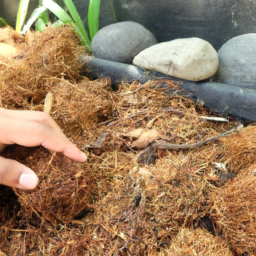How to Use Coconut Coir in Gardening
How To Use Coconut Coir In Gardening
Exploring the Benefits of Coconut Coir in Gardening
What is Coconut Coir?
Coconut coir, known as coco coir, or cocopeat, is a byproduct of the processing of coconut husks. It is made of an organic, biodegradable material called lignin, which is composed of fibers and pith. This lignin is then mashed and cut into small pieces to create a spongy material. Coconut coir has become increasingly popular in recent years due to its many benefits in gardening.
Benefits of Coconut Coir Over Other Soil Products
Due to its fibrous nature, coconut coir retains and releases moisture better than other soil products. Additionally, it is a more economical soil product, as it has a longer life, usually lasting up to 15 years. Its long life span also reduces the need for chemical fertilizers, which can harm the soil.
Coconut coir is also more sustainable than other soil products, as it is made from renewable sources. It is also more convenient to use than other soil products, as it requires less maintenance and is highly efficient at retaining and regulating soil moisture.
How to Use Coconut Coir in Gardening
Coconut coir can be used in various types of gardening, including hydroponics, indoor gardening and outdoor gardening. It can be used as a base fill, as a soil amendment, and as a growing medium.
For hydroponics, coconut coir can be used as a growing medium. The material's spongy nature allows for optimum water retention, and its fibrous structure provides an ideal medium for air exchange. Coconut coir can also be used to help free the hydroponic nutrient solution from salt buildup, as it has the ability to absorb excess salts.
Indoor gardening is also a great way to use coconut coir. The material can be used as a growing medium, or as an amendment to your existing soil mixture. Coconut coir's unique water-holding capacity keeps soil loose and well-aerated, while its fibrous structure allows oxygen to reach the roots of the plants.
Outdoor gardening can also benefit from the use of coconut coir. The material can be used as a base fill or as a soil amendment. Its high porous nature helps maintain water in the soil, while its fibrous structure helps to aerate the soil and improve soil drainage. Additionally, coconut coir helps to retain nutrients in the soil, making it an ideal medium for growing vegetables, fruits, and flowers.
Potential Pitfalls of Coconut Coir in Gardening
Coconut coir is not without its drawbacks, however. One of the main drawbacks of coconut coir is its tendency to absorb and retain too much moisture. If the soil is left too wet for too long, it can lead to overwatering and root rot issues. Additionally, like with any soil product, coconut coir should be used in moderation, as too much of it can lead to the soil becoming too dense and compacted, ultimately leading to slower growth.
Closing Remarks
Coconut coir is an increasingly popular soil product due to its many benefits, including its ability to retain and regulate soil moisture, its sustainability, and its efficiency in hydroponics. Coconut coir can be used in various types of gardening, but it should be used in moderation, as too much of it can lead to slower plant growth.
References:
1. https://modernfarmer.com/2013/03/coconut-coir-the-miracle-grow-medium-for-hydroponics-soilless-gardening/
2. https://www.thegardenbuzz.com/indoor-gardening-with-coconut-coir-2/
3. https://gardeningknowhow.com/garden-how-to/soil-fertilizers/using-coconut-coir-gardening.htm

Previous Page
